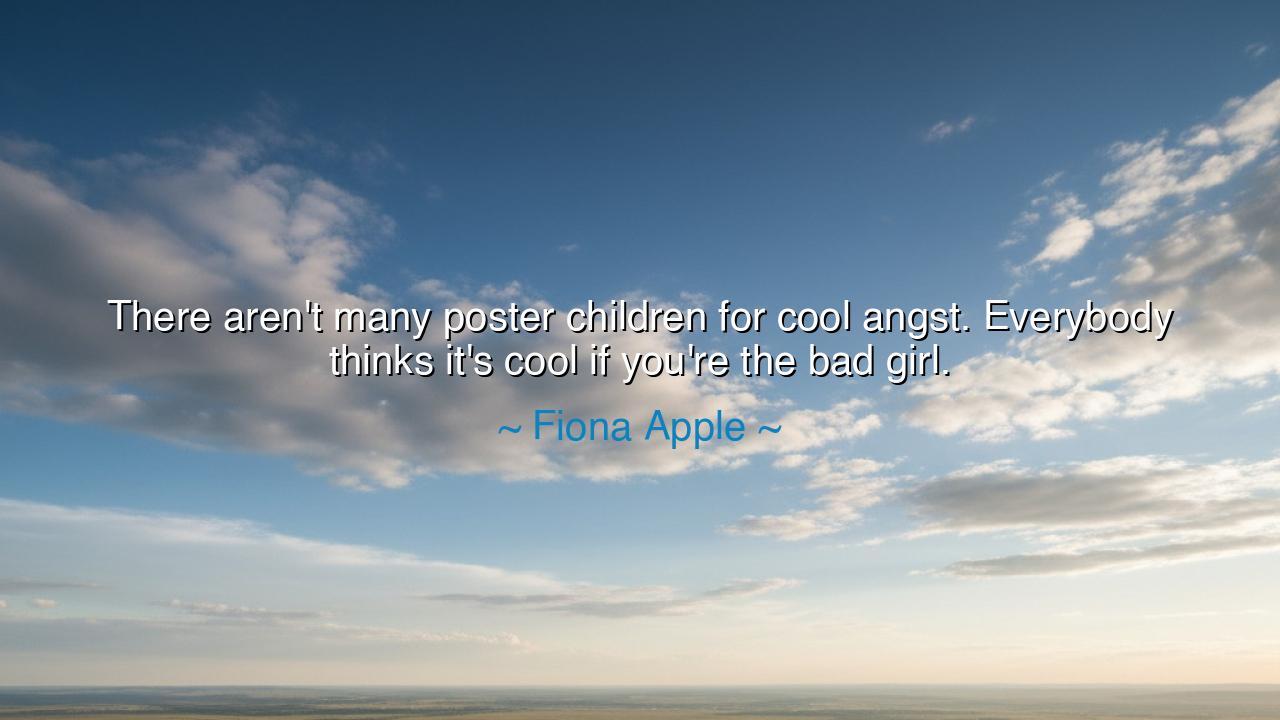
There aren't many poster children for cool angst. Everybody
There aren't many poster children for cool angst. Everybody thinks it's cool if you're the bad girl.






Fiona Apple’s words, "There aren't many poster children for cool angst. Everybody thinks it's cool if you're the bad girl," speak to the tension between societal expectations and the authentic expression of inner turmoil. In this striking statement, Apple addresses the paradox of angst—that deep, sometimes dark feeling of alienation or rebellion. She points out how, in modern culture, there is often a glamorization of the bad girl—the figure who defies rules, breaks boundaries, and expresses her dissatisfaction with the world. Yet, beneath this surface-level appeal lies a much deeper question: is this truly cool, or is it just a mask for something more vulnerable?
In the ancient world, the struggle between conformity and individuality was also present. Socrates, the great Greek philosopher, was often seen as a figure of defiance in Athens, questioning established norms and challenging the status quo. His angst—his inner struggle to understand the world and his place within it—was not just a rejection of authority but a pursuit of truth. However, Socrates was not celebrated in his time for being the "cool" philosopher; rather, he was regarded with suspicion, and his uncompromising nature eventually led to his death. This story reminds us that true individuality and inner struggle are often misunderstood, and it takes courage to live authentically, much like Apple’s portrayal of the bad girl who, in her defiance, seeks to carve her own path.
Apple’s insight also speaks to the modern idolization of rebellion, which is often reduced to a superficial image rather than the genuine emotional depth that rebellion entails. In the 20th century, we saw the rise of rock stars and artists who embodied the "bad boy" and "bad girl" archetype—figures like Jim Morrison of The Doors or Courtney Love of Hole, who were both seen as symbols of defiance. However, much of their persona was built on a myth, a constructed image of rebellion, rather than the lived experience of emotional and philosophical struggle. Apple’s remark calls attention to the disconnection between the glamourization of rebellion and the real emotional labor required to face one’s own angst in a meaningful way.
The real challenge, Apple suggests, is not simply embracing rebellion for the sake of being cool, but rather embracing the vulnerability and pain that often lie at the heart of such defiance. The "bad girl" image may be alluring, but it often overlooks the struggles and insecurities that accompany the rejection of societal norms. In the life of Frida Kahlo, for instance, we see the embodiment of defiance not as a mere act of rebellion, but as a form of self-expression forged in the fire of personal suffering. Kahlo’s art, which expressed her physical pain, emotional turmoil, and her struggles with identity, was not about being "cool" in the conventional sense; it was about embracing her authenticity and creating something profound from her personal experience.
The lesson here, then, is one of authenticity over image. Apple’s words invite us to consider the deeper motivations behind the desire to be seen as "cool." True angst and rebellion are not just about breaking rules for the sake of appearance; they are about understanding oneself, and ultimately, about confronting life’s most difficult truths with courage. In the ancient myths, figures like Achilles or Antigone did not live for superficial rebellion, but for a deeper sense of honor and moral conviction. Their struggles were not motivated by a desire for attention or image, but by an internal sense of what was right in a world full of chaos.
In our own lives, we must resist the allure of empty rebellion—the temptation to reject societal norms simply to be seen as cool. Instead, we should embrace the genuine process of self-exploration and self-expression, even if that means confronting our vulnerabilities and insecurities. We must learn to live authentically, not for the admiration of others, but for the fulfillment that comes from understanding and accepting ourselves fully. Just as Apple’s "bad girl" persona does not define her real struggles, so too should we recognize that true strength comes from within, not from the external perceptions of others.
Let us then seek to understand our own inner angst not as a means to an image, but as a source of growth. Like the great philosophers and artists of history, we must embrace our struggles, not for the fame or the status they might bring, but for the deeper understanding they offer of who we truly are. The true lesson from Apple’s words is this: be authentic, be vulnerable, and do not let the world’s shallow definitions of cool obscure the real work of discovering yourself. Only in that authenticity can we transcend the empty rebellion and find something truly lasting—wisdom and self-understanding.






AAdministratorAdministrator
Welcome, honored guests. Please leave a comment, we will respond soon